|
Books Should Be Free Loyal Books Free Public Domain Audiobooks & eBook Downloads |
|
|
Books Should Be Free Loyal Books Free Public Domain Audiobooks & eBook Downloads |
|
Religion |
|---|
|
Book type:
Sort by:
View by:
|
By: Baha'i World Centre | |
|---|---|
 Bahíyyih Khánum
Bahíyyih Khánum
| |
By: Barbara Hofland (1770-1844) | |
|---|---|
 The Barbadoes Girl
The Barbadoes Girl
Matilda Sophia Hanson, whose father has recently died in their country of Barbadoes in the West Indies, must live for a time with family friends in England. The Harewood family is astonished at how spoiled, rude, and uneducated the child is. However, with seemingly endless patience and love, they help Matilda work to conquer her bad temper, and become a sensible, good, and well-informed young lady. This story reminds children and adults alike, though you have many battles with yourself, you must never relinquish hope and be assured you will find every victory easier than the last... | |
By: Barbara R. (Barbara Rutledge) Sims (1918-2002) | |
|---|---|
 Japan Will Turn Ablaze!
Japan Will Turn Ablaze!
| |
By: Baron Paul Henri Thiry d'Holbach (1723-1789) | |
|---|---|
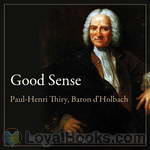 Good Sense
Good Sense
In 1770, Baron D'Holbach published his masterpiece, "Systeme de la Nature", which for a long time passed as the posthumous work of M. de Mirabaud. That text-book of "Atheistical Philosophy" caused a great sensation, and two years later, 1772, the Baron published this excellent abridgment of it, freed from arbitrary ideas; and by its clearness of expression, facility, and precision of style, rendered it most suitable for the average student. This text is based on an undated English translation of "Le Bon Sens" published c. 1900. The name of the translator was not stated. | |
By: Basil Hall Chamberlain (1850-1935) | |
|---|---|
 The Invention of a New Religion
The Invention of a New Religion
| |
By: Benjamin Disraeli (1804-1881) | |
|---|---|
 Tancred Or, The New Crusade
Tancred Or, The New Crusade
| |
By: Bernard Fresenborg (1847-) | |
|---|---|
 "Thirty Years In Hell" Or, "From Darkness to Light"
"Thirty Years In Hell" Or, "From Darkness to Light"
| |
By: Bernard Shaw (1856-1950) | |
|---|---|
 Bernard Shaw's Preface to Androcles and the Lion
Bernard Shaw's Preface to Androcles and the Lion
| |
By: Bernie Babcock (1868-1962) | |
|---|---|
 The Coming of the King
The Coming of the King
| |
By: Berthold Auerbach (1812-1882) | |
|---|---|
 Christian Gellert's Last Christmas From "German Tales" Published by the American Publishers' Corporation
Christian Gellert's Last Christmas From "German Tales" Published by the American Publishers' Corporation
| |
By: Bertram Coghill Alan Windle (1858-1929) | |
|---|---|
 Science and Morals and Other Essays
Science and Morals and Other Essays
| |
By: Brontë sisters | |
|---|---|
 Selected Poems by Currer, Ellis and Acton Bell
Selected Poems by Currer, Ellis and Acton Bell
Poems by Currer, Ellis and Acton Bell was a volume of poetry published jointly by the three Bronte sisters, Charlotte, Emily and Anne in 1846, and their first work to ever go in print. To evade contemporary prejudice against female writers, the Bronte sisters adopted androgynous first names. Marked by profound sentiments, gravity and melodious harmony, the poems are strewn on the fields of soulful love, rueful reminiscence and the immortal yearnings of a Christian soul, and represent a fragrant assemblage of noetic flowers from the glebes of olden England... | |
By: Bruce S. Wright | |
|---|---|
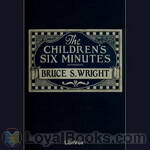 The Children's Six Minutes
The Children's Six Minutes
This is a nice collection of 52 kid-aimed sermons by missionary Wright while he served in the Philippines in the World War I era. Each offers a slice-of-life reference point, an appropriate Bible verse, and hymn. | |
By: BS Murthy | |
|---|---|
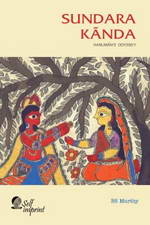 Sundara Kãnda: Hanuman's Odyssey
Sundara Kãnda: Hanuman's Odyssey
If Mahabharata's Bhagvad-Gita is taken as a philosophical guide, Ramayana's Sundara Kãnda is sought for spiritual solace. What is more, many believe that reading Sundara Kãnda or hearing it recited would remove all hurdles and usher in good tidings! Well miracles apart, it's in the nature of Sundara Kãnda to inculcate fortitude and generate hope in one and all. After all, isn't it a depiction of how Hanuman goes about his errand against all odds! Again, won't it portray how Seetha, on the... | |
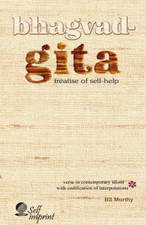 Bhagvad-Gita: Treatise of Self-help
Bhagvad-Gita: Treatise of Self-help
The spiritual ethos and the philosophical outlook that the Bhagvad - Gita postulates paves the way for the liberation of man, who, as Rousseau said, ‘being born free, is everywhere in chains’. But equally it is a mirror of human psychology, which enables man to discern his debilities for appropriate redressal. All the same, the boon of an oral tradition that kept it alive for over two millennia became its bane with the proliferation of interpolations therein. Besides muddying its pristine philosophy, these insertions affect the sequential conformity and structural economy of the grand discourse... | |
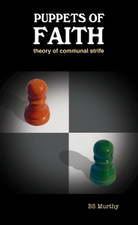 Puppets of Faith: Theory of Communal Strife
Puppets of Faith: Theory of Communal Strife
When a bunch of apparently non-practicing Musalmans headed by Mohamed Atta launched that fidayeen attack on New York’s World Trade Centre that Sep 11, the world at large, by then familiar with the ways of the Islamic terrorism, was at a loss to fathom the unthinkable source of that unexpected means of the new Islamist scourge. The symptoms of a latent terrorist in the Muslim youth can be traced to the sublimity of Muhammad's preaching’s in Mecca and the severity of his Medina sermons make Islam a Janus-faced faith that forever bedevils the mind of the Musalmans... | |
By: Byron J. (Byron Johnson) Rees (1877-1920) | |
|---|---|
 The Heart-Cry of Jesus
The Heart-Cry of Jesus
| |
By: C. J. (Charles John) Ellicott (1819-1905) | |
|---|---|
 Addresses on the Revised Version of Holy Scripture
Addresses on the Revised Version of Holy Scripture
| |
By: C. T. (Charles Thomas) Studd (1860-1931) | |
|---|---|
 The Chocolate Soldier Or, Heroism—The Lost Chord of Christianity
The Chocolate Soldier Or, Heroism—The Lost Chord of Christianity
| |
By: Caroline Atwater Mason (1853-1939) | |
|---|---|
 Woman Of Yesterday
Woman Of Yesterday
Anna is the daughter of a clergyman in a small town in Vermont. She is very happy with her lot. But when she goes to nurse a woman in the big city, she starts to discover the world. She sees new places, meets new people, and falls in love. This will test all the resolutions she once held dear. - Summary by Stav Nisser. | |
By: Caroline Hadley | |
|---|---|
 Woodside or, Look, Listen, and Learn.
Woodside or, Look, Listen, and Learn.
| |
By: Chapman Cohen (1868-) | |
|---|---|
 Religion & Sex Studies in the Pathology of Religious Development
Religion & Sex Studies in the Pathology of Religious Development
| |
By: Charles Alexander Eastman (1858-1939) | |
|---|---|
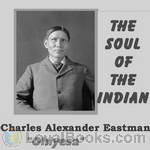 The Soul of the Indian
The Soul of the Indian
"We also have a religion which was given to our forefathers, and has been handed down to us their children. It teaches us to be thankful, to be united, and to love one another! We never quarrel about religion." | |
By: Charles Beard (1827-1888) | |
|---|---|
 Beside the Still Waters A Sermon
Beside the Still Waters A Sermon
| |
 Strong Souls A Sermon
Strong Souls A Sermon
| |
By: Charles Bradlaugh (1833-1891) | |
|---|---|
 Ancient and Modern Celebrated Freethinkers
Ancient and Modern Celebrated Freethinkers
| |
 Humanity's Gain from Unbelief Reprinted from the "North American Review" of March, 1889
Humanity's Gain from Unbelief Reprinted from the "North American Review" of March, 1889
| |
By: Charles Bruce | |
|---|---|
 Leslie Ross: or, Fond of a Lark
Leslie Ross: or, Fond of a Lark
| |
By: Charles Ebert Orr (1861-1933) | |
|---|---|
 How to Live a Holy Life
How to Live a Holy Life
| |
 The Gospel Day Or, the Light of Christianity
The Gospel Day Or, the Light of Christianity
| |
By: Charles Foster Kent | |
|---|---|
 The Making of a Nation: The Beginnings of Israel's History
The Making of a Nation: The Beginnings of Israel's History
Charles Foster Kent was one of the premier scholars in Jewish Studies at the turn of the century. He was particularly well-known for his comparisons of early Christianity to its Jewish roots. He also wrote several distinguished histories of Israel, the Jewish people, Torah studies, and the development of oral Torah. | |
By: Charles Francis Stocking (1873-) | |
|---|---|
 Carmen Ariza
Carmen Ariza
| |
By: Charles H. Spurgeon (1834-1892) | |
|---|---|
 Talks To Farmers
Talks To Farmers
This is a collection of nineteen sermons given by the Baptist preacher, Charles Spurgeon, using illustrations from rural settings. | |
By: Charles J. (Charles John) Abbey (1833-1919) | |
|---|---|
 The English Church in the Eighteenth Century
The English Church in the Eighteenth Century
| |
By: Charles Jerome Callan (1877-1962) | |
|---|---|
 The Shepherd Of My Soul
The Shepherd Of My Soul
| |
By: Charles L. (Charles Latimer) Marson (1858-1914) | |
|---|---|
 Hugh, Bishop of Lincoln A Short Story of One of the Makers of Mediaeval England
Hugh, Bishop of Lincoln A Short Story of One of the Makers of Mediaeval England
| |
By: Charles Mackay (1814-1889) | |
|---|---|
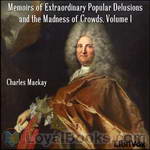 Memoirs of Extraordinary Popular Delusions and the Madness of Crowds
Memoirs of Extraordinary Popular Delusions and the Madness of Crowds
The book chronicles and vilifies its targets in three parts: “National Delusions”, “Peculiar Follies”, and “Philosophical Delusions”.The subjects of Mackay’s debunking include alchemy, beards (influence of politics and religion on), witch-hunts, crusades and duels. Present day writers on economics, such as Andrew Tobias, laud the three chapters on economic bubbles. | |
By: Charles Monroe Sheldon (1857-1946) | |
|---|---|
 In His Steps
In His Steps
In His Steps takes place in the railroad town of Raymond. The main character is the Rev. Henry Maxwell, pastor of the First Church of Raymond, who challenges his congregation to not do anything for a whole year without first asking: “What Would Jesus Do?” (taken from Wikipedia) | |
 Robert Hardy's Seven Days A Dream and Its Consequences
Robert Hardy's Seven Days A Dream and Its Consequences
| |
 The High Calling
The High Calling
| |
By: Charles Paschal Telesphore Chiniquy (1809-1899) | |
|---|---|
 The Priest, The Woman And The Confessional
The Priest, The Woman And The Confessional
| |
By: Charles Rosenbury Erdman (1866-1960) | |
|---|---|
 The Gospel of Luke, An Exposition
The Gospel of Luke, An Exposition
| |
By: Charles Sainte-Foi (1806-1861) | |
|---|---|
 Serious Hours of a Young Lady
Serious Hours of a Young Lady
| |
By: Charles Southwell (1814-1860) | |
|---|---|
 An Apology for Atheism Addressed to Religious Investigators of Every Denomination by One of Its Apostles
An Apology for Atheism Addressed to Religious Investigators of Every Denomination by One of Its Apostles
| |
 Superstition Unveiled
Superstition Unveiled
| |
By: Charles W. Leadbeater (1854-1934) | |
|---|---|
 The Astral Plane Its Scenery, Inhabitants and Phenomena
The Astral Plane Its Scenery, Inhabitants and Phenomena
| |
 Clairvoyance
Clairvoyance
| |
 A Textbook of Theosophy
A Textbook of Theosophy
| |
By: Charles Wesley Naylor (1874-1950) | |
|---|---|
 Heart Talks
Heart Talks
| |
By: Charlotte M. Higgins | |
|---|---|
 The Angel Children or, Stories from Cloud-Land
The Angel Children or, Stories from Cloud-Land
| |
By: Charlotte Maria Tucker (1821-1893) | |
|---|---|
 Spanish Cavalier
Spanish Cavalier
When his father dies, Lucius Lepine goes to Spain as a clerk. His fellow clerk, Don Aguilera, doesn't come to work one day. Lucius is worried, he has heard rumors of what has happened to Aguilera. What has happened? Can Lucius find out? | |
By: Charlotte Maria Tucker (A. L. O. E.) (1821-1893) | |
|---|---|
 Precepts in Practice; or, Stories Illustrating the Proverbs
Precepts in Practice; or, Stories Illustrating the Proverbs
Fifteen short stories that are full of morals and wisdom, warmth and comfort, charm and wit—all inspired by the book of Proverbs. Each of the stories are recapped with perceptive poems. This special collection of tales are sure to influence listeners of all ages with godly lessons to heed and help draw nearer to His Word. | |
 Children's Tabernacle; Or, Hand Work and Heart Work
Children's Tabernacle; Or, Hand Work and Heart Work
Bored with whittling, embroidery and other amusements, five children and their mother set out to build a model of the tabernacle. As the pillars are fashioned and the curtains sewn, the children learn the importance of types in the Old Testament. The showbread on the table in the Holy Place is a type of Christ being the bread of life; the offerings for leprosy were a type of cleansing from sin; the Holy of Holies was a type of God's presence, etc. One day, though, twelve-year-old Dora finds herself in trouble. Will the way be opened for her--from a mere tabernacle model to a new knowledge of forgiveness? - Summary by Bethesda Lily | |
 Stories of the Wars of the Jews
Stories of the Wars of the Jews
Stories of the Wars of the Jews from the Babylonish captivity, to the destruction of Jerusalem by Titus is a historical narrative spanning Jewish history from 586 B.C.E to 70 A.D. There is no history more fraught with interest, or conveying more important lessons than that of God’s chosen nation. There are no annals which display instances of more heroic courage, faith, and self-devotion and of darker apostasy and crime,—than those of the descendants of Abraham. | |